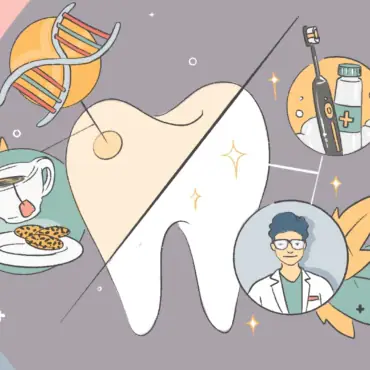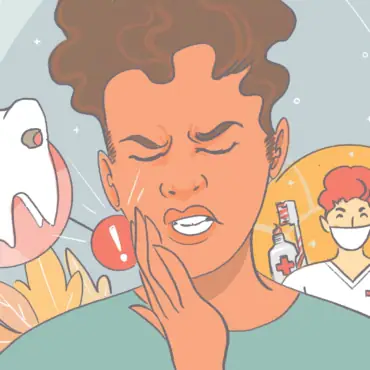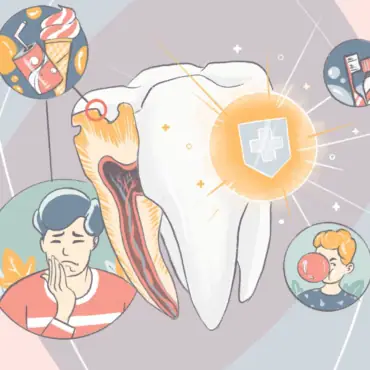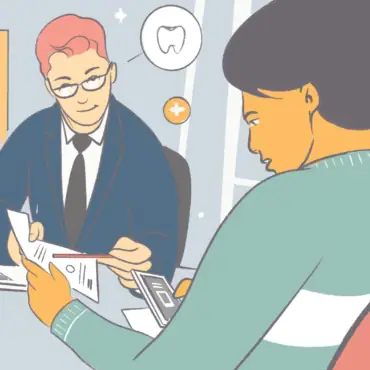Getting more patients can be hard. Dentist referral programs are an excellent way to let your current patients sing your praises and help grow your business. If your neighbor had a great porch built, or your friend got an excellent haircut, you would ask who did the work and if they’d recommend that business or service. Dentist referral programs are just a formalized way of doing just that.
Give $50, get $50.
Refer someone to book a dentist with Opencare and you’ll both get $50.
This guide will walk you through what you need to know about dentist referral programs, what actions you’ll need to take before launching a program, how to get your first referrals, and how to expand your program once it’s up and running.
What is a Dentist Referral Program?
Basically, a dentist referral program is a system that rewards your current patients for referring their friends, family, coworkers, or anyone else, to your practice. Think of it like the best type of rewards program, amped up by positive word-of-mouth. There’s no direct charge for the referral but you will need to do some initial work to set up the program.
There are other options for growing your patient flow, including insurance networks and advertising campaigns, but these can be costly. If these methods just aren’t the right fit for your practice, dental referral programs are a great way to start small and simple and still make a big, and potentially long-lasting, impact.
Why New and Established Practices Need a Referral Program
Sometimes, all it takes are a few happy and talkative customers early on to get a new dental practice rolling. Even just a few clients are powerful enough to create a lot of buzz, considering that 1,000 customers can have approximately 500,000 conversations related to brands.
While the average new dental practice won’t have 1,000 patients ready to start spreading the word, even a handful of patients could lead to a few thousand conversations about the office over time. Better yet, roughly 67 percent of those conversations are likely to be positive.
If your practice is established, you’ve done the work creating great relationships with your current clients. Building your own referral program will let you benefit from those connections. Considering a successful practice can lose nearly 20% of their patients a year, a dentist referral program can also help keep your client base stocked.
Referrals matter a lot to the average customer. In a report by the American Academy of Cosmetic Dentistry, 93 percent of respondents considered “referrals from friends and family who had good results” a factor in choosing which cosmetic dentist to go to — relying on these recommendations more than any other factor.
The key factor of referral programs? Patients are more likely to refer others if they themselves are receiving excellent care at your practice. If you’re confident in your service, you’re ready to start building your dentist referral program.
Laying the Groundwork for Your Dental Patient Referral Program
Once you’ve learned the basics about dental patient referral programs, you can begin formulating what your program will look like. Here are a few basic considerations for anyone in the early stages of generating a dental referral program.
Step 1: Create a Benchmark Figure
To start you’ll need benchmark goals for how many of your new patients you would like to gain through referrals. Ideally, at least half of the patients at a dental practice should come through referrals, with one marketing specialist stating that “If not, then you’re losing them to other practices.”
Don’t stress over making this quota, but it’s a great number to keep top of mind and communicate with your staff. For example, if your goal is 50 percent and you’re hovering below that number, let your teammates know and work together to try and get closer. If most of your new patients are coming through traditional methods (like advertising or insurance networks) that’s great, but remember the number of potential clients that are just waiting for you if you hit your referral targets.
Step 2: Determine Your Overall Goal
For some new dentists, even a handful of successful referrals each month can help get a practice get off the ground. In this case, numbers matter. But other practitioners might decide that a referral program is not about getting more business but better business.
We suggest setting an overall goal so you know what you’re working towards. This will make it easier to celebrate your goals once you reach them or focus on areas to improve. Remember that referral programs have about a 10 percent conversion rate, this varies widely depending on the industry and the sales management of the particular business.
Step 3: Learn the Law and Set Your Rules
The law can seem a little murky around dental patient referral programs, but don’t worry! One marketing consultant stressed that these laws don’t apply to dentists rewarding patients for referrals: “I don’t know any dentist sitting in jail for having a patient referral program … It’s a gray area.”
Section 5.F.4. of the American Dental Association’s Principles of Ethic and Code of Professional Conduct states, “A dentist is allowed to pay for any advertising permitted by the Code, but is generally not permitted to make payments to another person or entity for the referral of a patient for professional services.”
Dentists are also bound by two federal referral laws for doctors, the Stark Law and the Copeland “anti-kickback” Act.
Typically, if you avoid paying third-party services to refer patients you should be in the clear. But check with your state regulations so you’re familiar with your local laws. Write down your rules and communicate them to your teams so everyone understands the rules and sticks to them.
Step 4: Make Participation Easy
Don’t make your patients jump through hoops or feel nervous about participating in your dental referral program. Any patient should feel welcome to refer a friend, family member, or coworker to a dental practice —and trust that, when they do, the person will be welcomed and receive excellent service.
Bring up the referral program naturally and honestly with patients. Any digital or manual steps that a patient has to take to complete a referral should be easy, short, and as delightful as possible. Why is this important? Well, as a general rule, the more difficult it is for patients to participate in a referral program, the lower the conversion rate will be.
Grow your dental practice
Opencare is the only risk-free patient acquisition solution for dentists.
Participating in referral programs should also be easy for your staff, so have scripts at the ready to help get them started. Until everyone gets the hang of what to ask, scripts are a great tool to make the process easier for everyone. But keep it simple. Try just a few lines on a Post-it Note that reminds staff to ask prospective patients how they heard about your practice and the name of whoever referred them.
Step 5: Pick Quality Rewards
Nothing kills a dental referral rewards program faster than boring prizes. Now, this is the fun part. Imagine you were your patient or ask your teams for input. What would you want to receive? What would make you feel appreciated and be worth your while?
Would a cheap water bottle really make you feel glad you sent your favorite neighbor to your dental practice? Probably not. We suggest providing goods and services of actual value to customers — such as free or heavily discounted dental services.
Step 6: Get Your First Dental Referrals
Time to get started! Here are a few things to keep in mind when seeking out your first referrals.
Invite The Best First
It’s okay to have favorites, we won’t tell. Reach out to some of your best clients first and let them know of your all-new rewards program! A 2016 study found that, on average, every customer of a business will refer 2.68 of their friends. And that’s just the average customer. Think about how many people an enthusiastic and excited patient might refer.
Deploy Referral Cards
Stock your front desk with referral cards that can be handed out to patients after their appointment. All you’ll need are some business sized-cards that highlight the type of rewards your patients could receive if they bring in a referral. Have these cards in a spot where they’ll quickly catch the eye of a patient while they’re making their next appointment or settling their bill.
Encourage patients to take more than one card if they seem excited. You can even encourage them to contribute to patient referral program ideas.
Use Social Media
Social media can be a great tool for the soft launch of an advertising campaign related to a new referral program and provide powerful channels for driving referrals. A marketing study found that 81 percent of consumers get “influenced by social media posts from their friends.”
The vast majority of referral offers are shared by copy-and-paste or email, 3.9 percent are shared via Facebook, and 0.7 percent are shared via Twitter. There’s also nothing wrong with dabbling in sponsored posts on a few different platforms like Instagram to see what works best.
Involve Your Staff
It goes without saying you’ll need your staff’s help to fully capitalize on referrals. Excellent customer service will be key to make current patients confident to give out referrals and welcome the potential new patients.
Final Step: Collect and Reflect
Collect your referrals and schedule a time to review. Are you reaching your benchmarks and overall goals? If so, celebrate with your team! If not, we’ve collected five tips to help your existing program grow.
5 Tips to Expand Your Dental Referral Program
If at First Your Referral Program Doesn’t Succeed
Keep fine-tuning! While Thomas Edison was inventing the lightbulb, he famously said, “I haven’t failed — I’ve just found 10,000 that won’t work.” The lightbulb wasn’t a flop, was it?
It’s common knowledge that referral programs work, but there can be many challenges in the beginning. These can include lackluster reward incentives or a weaker-than-normal economy.
There’s also the possibility that the dental services aren’t wowing your patients, which dissuades them from referring a practice. (See step 4 to be sure this isn’t the case.)
Find out if your rewards excite your patients. Keep trying until that lightbulb glows.
Step Out of Digital Advertising
Referral prompts that work on Facebook or another social media platform can very likely be scaled to other platforms. If you have the budget, perhaps a brilliant Twitter ad might make a great billboard. Or maybe the ad could be tweaked to become a glossy mailer to be sent to several thousand households.
Whatever the case, your next big ad could be right behind an affordable social media test run. You might be surprised by the costs depending on the amount or location, so check out what space and services are available in your area.
Spread the Word by Email
Dental referral programs often rely on word-of-mouth. That said, there’s nothing keeping dentists from blasting out incentives to their entire digital customer bases. Email marketing programs such as Constant Contact and MailChimp make it easier than ever for dentists to encourage their best customers to refer others.
Survey Your Patients
One easy way to pre-qualify patients to give referrals is by conducting a short, informal survey at the end of every visit. Ask patients if they were happy with the service they just received and if so, encourage them to give a referral.
Say Thanks
This often gets forgotten so make sure your practice gets this right! Whenever your office staff learns that a customer has brought in a referral the reward is just the beginning. Be sure to give a sincere thank-you by phone, card, or email. Show your patients you appreciate their trust and referral personally.
Good luck with all your referral program goals! We’re rooting for you.
Grow your dental practice
Opencare is the only risk-free patient acquisition solution for dentists.








